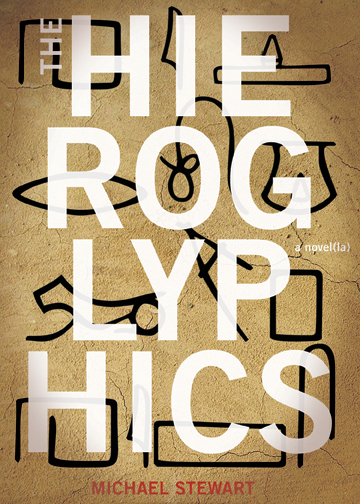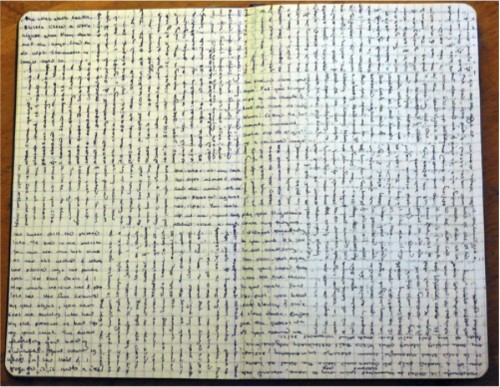Author Spotlight
13 ways of looking at Michael Stewart: An Interview
Back in 2001, I took my very first fiction workshop. It was with Catherine Kasper. I’d never written a short story before. I was a junior. My first story submission was terrible, truly terrible.
Despite my really shitty story, Michael Stewart was nice to me.
I thought he was the best writer in class. (And he was.) And there were some spectacular writers in class.
Over the past decade, Michael and I have consumed a lot of coffee and breakfast tacos together. We have played many chess games and go games. We have seen each other’s heartbreaks and victories.
Michael Stewart is a charming man and a charming writer. His first book, The Hieroglpyhics, is out now (and can be purchased here) with Mud Luscious Press.
The Hieroglyphics is a careful examination of language and mythology, or maybe mythological language, or maybe the language of mythology. For instance, this is the first page:
God is like a beast; he does not know time. To know time is man’s alone, it is a weight only the seed of Adam may feel.
Stewart composes in sentences so deceptively simple – and a language so gracefully common – that by the time you’re done reading, you have been rendered a fool twice over without knowing it. And, along the way somewhere, you have fallen in love and been cheated on and gotten married and maybe even divorced, who knows, you certainly don’t. I’ve read The Hieroglyphics a number of times in a number of different forms. Each time, I read it in just one sitting. Each time, it’s falling into Wonderland. I have never finished this book as the same person. Now, that is magic.
And now, without further ado: 13 Ways of Looking at Michael Stewart!
1. The Hieroglyphics is clearly grounded in a variety of creation myths. You combine the Judeo-Christian Adam with Egyptian mythology with Greek mythology, etc. What is the value of this merging of mythology? What do you hope to accomplish?
The original text, which was ostensibly a Judeo-Christian interpretation of the hieroglyphics, did most of this for me. Throughout the book, I braided sentences from the Hieroglyphica as well as the Book of Jubilees, the Book of Enoch, the Old Testament, etc. The intent was to create a tension between the original language and my own, to see what oddities were exposed when a selection was taken from its context and placed near something wholly different.
2. Define “play.”
The book started as a language experiment. I was very impressed with certain moments in the original (i.e. it is the smoothest like water) and I wanted to play with those moments, to see what would happen when I worked off of them. Slowly, however a narrative started to form and when it did I tried to embrace that.
3. This book, like all of your work, is very carefully written and constructed. Can you tell me about your process? Do you write by hand? By computer? On plain paper or ruled or squared? Does the type of pen matter? Do you use MS word? Etc etc etc.
I write in an obsessively specific way. With a pen on graph paper, I make interlocking gridded elements, turning around a specific word or phrase. (This is why I think my work tends to echo and why my pieces are so short.) Here is a picture:
When I transcribe, I do not like to use Word, but I will open it up when putting together a story/book that requires section breaks and a table of contents. Typically, I prefer simple text editors; the fewer options the better, the more responsive the better. Delays it seems are fatal to my more interesting ideas.
4. Do you often remember your dreams when you wake? Is there any value in dreams?
Yes, I almost always remember my dreams, but I do not write them down. I just let them sort of fade away. Most of my writing is done in the morning before I’ve spoken to anyone, so the dream’s odd logic often invades my work; the disjointed imagery and casual transitions inform how I approach almost every story.
5. When you are not reading, writing, or teaching, what do you do for entertainment?
Orgies— acrobatic, carefully orchestrated, and operatic. Think Eyes Wide Shut meets Cirque du Soleil meets Don Giovanni. And I like to cook.
6. Do you prefer parataxis or conjunctions? Stand your ground.
That leap between sentences—that gap—is one of the most delightful moments for me as a reader. I love the momentary confusion. And it is made all the better when, across the gap, there is a friendly looking conjunction extending his hand, seemingly to help, but he is really reaching out to a completely different narrative thread and lets you fall.
7. In a world not this one, what would you do?
I was asked a similar question for the Answers project. This was my answer:
Every time a child went to a mirror at night and whispered by name, I’d reply. Or I’d curl inside a girl’s mouth and quiver when she cussed. The devil and I playing backgammon, bottle caps for checkers and old teeth for dice. We’d sip Prosecco and lie to one another. Or I’d settle to the bottom of the sea, watch giant squids twist around leviathans while the stars dropped one by one from the sky.
8. What is your favorite thing to cook? Share a recipe.
I don’t have a favorite thing to cook any more than I have a favorite book, but here is a recipe for what I made just before sitting down and reading these questions:
Section a grapefruit and an orange, catching the juices in a small bowl. Thinly slice a red onion and dice an avocado. Add black olives, if you have them. Quickly beat a little olive oil and curry powder in with the reserved juices. Toss.
9. Proust or Joyce or Beckett?
You have probably heard this one before:
So, Hemingway is heading over to Joyce’s place in Paris and when he gets there he sees Joyce sitting on the floor, undershirt, bad breath, stains and papers all around him. Hemingway asks, Write anything today? Seven words. Well, that’s not so bad. No, but I don’t know what order they go in.
Woolf or Stein or Loy?
Myrna Loy.
Katy Perry or ke$ha or Lady Gaga?
I had to ask my students who two of those people are, which I think makes me culturally irrelevant.
Kanye West or Charlie Sheen?
I enjoy narcissism in all of its flavors.
Big press or small press or university press?
Each in their own way.
10. Is the book dying?
No, and it’s a silly question.
11. Tell me something clever and pithy:
Politically I lean like a tower in Pisa, that is to say liberally.
Tell me something terrible:
Descartes once said, “If you whip a dog whilst playing a violin, it will whimper in time to the music.”
Tell me something fantastic:
Rumor has it that there is a place in Algeria where two rivers meet, one with heavy deposits of iron the other with deposits of gallic acid. The force of the two rivers intersecting causes the chemicals to bind and for a short while makes a river of deep, black ink.
12. You have an MFA from Brown University. Is an MFA a “useful” degree? What did you learn or gain from your MFA?
An MFA is two/three years to work surrounded by people who share your interests. That can be fantastically useful if you make use of it. Is it necessary? No, unless you are aiming for a menial position at a University, pretty much any other use of your time will serve you better in terms of a career. If you want to be a writer, you should just write a lot. An MFA will help you carve out a safe place and time for that, but the rest is up to you.
Personally, my MFA helped me to identify myself as a writer—it served as a means of validation. I needed that, but I’m not sure everyone does.
13. Please insert a photograph that best exemplifies how you feel at this moment.
I’m not sure if I feel like the nun or the girl.
[The Hieroglyphics can be purchased through Mud Luscious Press. The Answers Project can be found on Michael Stewart’s website: StrangeSympathies.com]
Tags: michael stewart, mud luscious press





Michael is reading in NYC at KGB on April 16th.
Thanks for the reminder, Shya!
in-progress reading schedule is (currently):
4.15, 7:00 @ Books on the Square
4.16, 7:00 @ KGB
w/ Shya Scanlon, Tom Drury, & Terese Svoboda
4.22, 7:00 @ Unnameable Books
w/ Ryan Daily & Caroline Whitbeck
Come see – this book is spectacular,
Turbid troubadours.
Cool, Shya.
max b
vipshopper.us
This was fun to read.
Love this interview. Dug the Brief Encyclopedia of Modern Magic. And those draft pages are rad. I was just reading Perec’s piece on crossword puzzles, printed in the Believer. These gridded scrawlings feel in that spirit, somehow.